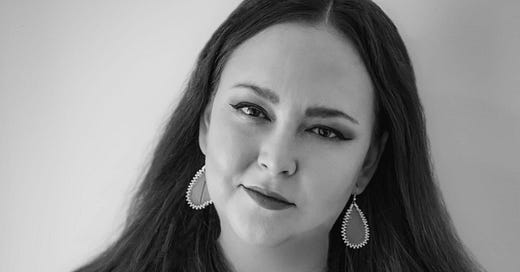You don’t need me to tell you that poetry is alive and well, but it’s true that the podcast so far has discussed the work only of dead poets. That changes today, when I get to release the ninth episode of Close Readings, in which I talk to the brilliant Sarah Dowling about a new poem by Liz Howard, “True Value.” You can find the episode on Apple Podcasts, Spotify, and Google Podcasts.
“True Value” was new to me, and I’m so grateful to Sarah for offering it for our discussion. It’s a thrilling poem. “True Value” seems to be taking place in the context of a legal proceeding that follows a sexual assault: we hear the court address the poet as “victim-witness,” the poem considers the multi-layered meanings of the legal term habeas corpus, and the poet is interrogated by “the Crown” about her past.
But it strikes me that one way to think about this poem is as a contest between two ways—really two systems—of defining the self. On the one hand we have legal and bureaucratic institutions, which have their own understanding of the rights and boundaries, the “values” and claims of citizens and residents of their jurisdictions. And on the other hand we have lyric poetry, which has long been defined (among other ways!) as the principal genre of interiority, consciousness, selfhood. One might be tempted to say that the former system, the legal, exercises a kind of violent misogyny on its subjects, but of course lyric poetry (witness our recent episode with Katie Kadue on Andrew Marvell’s “The Garden”) has its own deep and in some ways foundational history of misogyny. What Sarah so brilliantly unpacks for us in this conversation is how, in this poem, Liz Howard recalibrates the tools of poetry—line breaks, caesuras, metonymy, metalepsis, etc.—to wrest the future of the self away from the structures of misogyny, whether legal or literary, within which it has for so long been trapped.
Towards the end of our conversation, Sarah offers a brilliant reading of the poem’s final line (“I broke the line”):
I think we can think about the word “line” as referring to the writing of poetry, to the making of marks, but it also gives us a way to think back about some of the kinds of lineage that we’ve been referencing in terms of other poems, other discourses that come up here…that we can break that, too. In writing poetry we don’t just repeat by rote the sort of things that we’ve received. That in a text like this one that seems to have all the recognizable features of the lyric poem…you can still “break the line,” that can be what the poem is, the breaking of that line.
I’m so grateful to have had this chance to think not only about poetry’s history but also about its present—and future!—with Sarah.
A couple links to stray references in our conversation:
Howard mentions in the recording that a line in her poem refers to a line in a poem by Anne Boyer. The Boyer poem in question is “What Resembles the Grave But Isn’t.”
Sarah offers an illuminating reading of the way Howard’s poem echoes and revises Edgar Allan Poe’s “The Philosophy of Composition.”
It occurred to me—and then Sarah seemed also to think—that Howard may have poems by Sylvia Plath in mind: in particular one of the last poems Plath ever wrote, “Edge.”
Sarah brings up a famous essay by the scholar Barbara Johnson on the rhetorical figure of apostrophe: “Apostrophe, Animation, and Abortion.”
Sarah is the author of three poetry collections: Security Posture, Down, and Entering Sappho, which was a finalist for the Derek Walcott Prize for Poetry. Her first scholarly book, Translingual Poetics: Writing Personhood under Settler Colonialism, received an honorable mention for the Lora Romero First Book Prize from the American Studies Association. She’s also working on another scholarly book, Figure & Ground. Sarah teaches in Victoria College and the Centre for Comparative Literature at the University of Toronto. You can follow Sarah on Twitter here.
Liz Howard is currently the Shaftesbury Writer in Residence at Victoria College. She is the author of two poetry collections: Infinite Citizen of the Shaking Tent, which won the 2016 Griffin Poetry Prize, and Letters in a Bruised Cosmos, which contains “True Value,” and which was shortlisted for the Griffin Prize in 2022. The recording of Howard reading “True Value” (apologies for its low volume in the episode!) can be found here. Follow Liz on Twitter here.
As always, if you like the episode, make sure that you’re following the podcast, and please consider leaving a rating or review. Share it with a friend! Once again, you can find the episode on Apple Podcasts, Spotify, and Google Podcasts. More episodes coming soon—subscribe to the newsletter if you haven’t already for updates!




